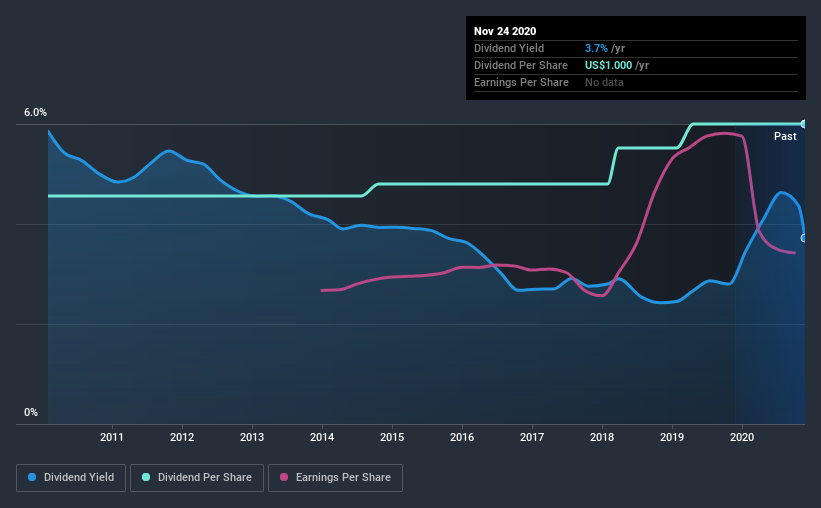ACNB Corporation (NASDAQ:ACNB) Will Pay A US$0.25 Dividend In Four Days
Regular readers will know that we love our dividends at Simply Wall St, which is why it's exciting to see ACNB Corporation (NASDAQ:ACNB) is about to trade ex-dividend in the next four days. Investors can purchase shares before the 30th of November in order to be eligible for this dividend, which will be paid on the 15th of December.
ACNB's next dividend payment will be US$0.25 per share, and in the last 12 months, the company paid a total of US$1.00 per share. Looking at the last 12 months of distributions, ACNB has a trailing yield of approximately 3.7% on its current stock price of $26.88. We love seeing companies pay a dividend, but it's also important to be sure that laying the golden eggs isn't going to kill our golden goose! We need to see whether the dividend is covered by earnings and if it's growing.
View our latest analysis for ACNB
Dividends are typically paid out of company income, so if a company pays out more than it earned, its dividend is usually at a higher risk of being cut. ACNB paid out more than half (50%) of its earnings last year, which is a regular payout ratio for most companies.
Companies that pay out less in dividends than they earn in profits generally have more sustainable dividends. The lower the payout ratio, the more wiggle room the business has before it could be forced to cut the dividend.
Click here to see how much of its profit ACNB paid out over the last 12 months.
Have Earnings And Dividends Been Growing?
Companies with consistently growing earnings per share generally make the best dividend stocks, as they usually find it easier to grow dividends per share. If earnings decline and the company is forced to cut its dividend, investors could watch the value of their investment go up in smoke. This is why it's a relief to see ACNB earnings per share are up 3.1% per annum over the last five years.
Many investors will assess a company's dividend performance by evaluating how much the dividend payments have changed over time. Since the start of our data, 10 years ago, ACNB has lifted its dividend by approximately 2.8% a year on average. It's encouraging to see the company lifting dividends while earnings are growing, suggesting at least some corporate interest in rewarding shareholders.
Final Takeaway
Has ACNB got what it takes to maintain its dividend payments? Earnings per share have been growing at a reasonable rate, and the company is paying out a bit over half its earnings as dividends. We're unconvinced on the company's merits, and think there might be better opportunities out there.
If you want to look further into ACNB, it's worth knowing the risks this business faces. In terms of investment risks, we've identified 4 warning signs with ACNB and understanding them should be part of your investment process.
If you're in the market for dividend stocks, we recommend checking our list of top dividend stocks with a greater than 2% yield and an upcoming dividend.
This article by Simply Wall St is general in nature. It does not constitute a recommendation to buy or sell any stock, and does not take account of your objectives, or your financial situation. We aim to bring you long-term focused analysis driven by fundamental data. Note that our analysis may not factor in the latest price-sensitive company announcements or qualitative material. Simply Wall St has no position in any stocks mentioned.
Have feedback on this article? Concerned about the content? Get in touch with us directly. Alternatively, email editorial-team@simplywallst.com.

 Yahoo Finance
Yahoo Finance 
